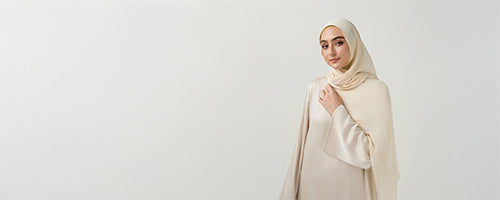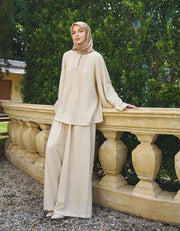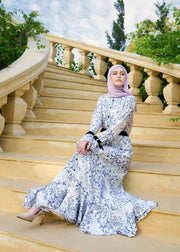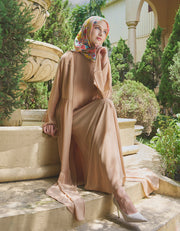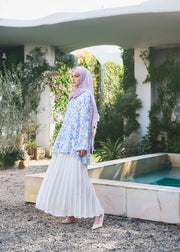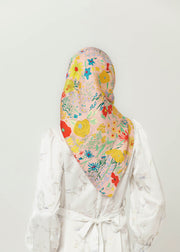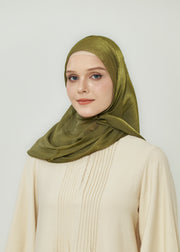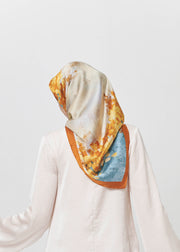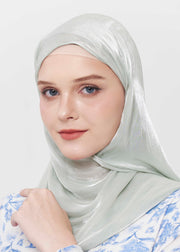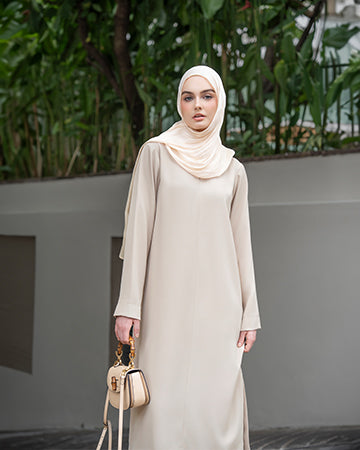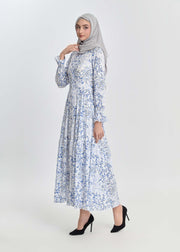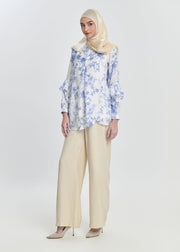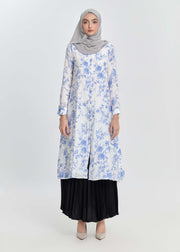Linen vs Cotton in Islamic Fashion: Which Is Better for Everyday Wear?
Choosing Between Linen and Cotton in Islamic Clothing
In the world of Islamic fashion, fabric choice defines not only how modest outfits look but also how they feel and perform throughout the day. For many Muslim women, the conversation around linen vs cotton Islamic fashion comes down to comfort, climate, and lifestyle.
Both fabrics are natural and breathable — but they serve different purposes. Linen speaks to minimalism and sustainability, while cotton reflects everyday comfort and reliability. Understanding the strengths of each helps you make thoughtful wardrobe decisions rooted in modesty and practicality.
Linen Modest Wear: Breathable Elegance for Warm Climates
If you live in a warm or humid region, linen modest wear feels like a gift. Made from flax fibers, linen is naturally lightweight, airy, and incredibly sustainable. It’s often chosen by women who value both modesty and environmental awareness.
Why so many modest fashion lovers prefer linen:
-
Naturally breathable: It allows air to circulate easily, making it ideal for summer days and tropical climates.
-
Effortlessly elegant: Its slightly crisp texture adds structure to abayas, kaftans, and tunics without compromising comfort.
-
Eco-friendly: Linen requires little water and almost no pesticides, aligning perfectly with the Islamic value of stewardship (khalifah) over the Earth.
From linen hijabs that stay cool and fresh to linen abayas that flow gracefully, this fabric carries an effortless charm that feels both refined and responsible.

Linen Modest Wear: Breathable Elegance for Warm Climates
Cotton Modest Wear: Everyday Comfort and Familiar Feel
While linen brings sophistication, cotton modest wear remains the comfort favorite for daily life. Cotton has been a wardrobe essential for centuries, known for its softness, versatility, and ease of care.
Why cotton continues to dominate Islamic clothing fabrics:
-
Soft on the skin: Perfect for everyday wear, especially for underlayers and hijabs.
-
Absorbent and comfortable: Keeps you cool and dry during long hours of activity or prayer.
-
Low maintenance: Unlike linen, cotton wrinkles less and is easy to wash and iron.
Cotton’s gentle touch and reliability make it an excellent choice for modest basics — from long-sleeved tops to flowy maxi dresses. It’s practical, accessible, and ideal for women who prioritize comfort in every aspect of their wardrobe.

Cotton Modest Wear: Everyday Comfort and Familiar Feel
Linen vs Cotton Islamic Fashion: Comfort vs Convenience
When comparing linen vs cotton Islamic fashion, both materials have distinct strengths — and your choice often depends on where you live and how you dress.
If you live in a hot climate, linen is your best friend. Its cooling nature and natural fibers help regulate body temperature even when you’re fully covered. It’s ideal for abayas, dresses, and loose tunics during the summer.
Cotton, however, works beautifully in mild or cooler weather. It’s cozy without being heavy, perfect for layering, and easy to style with other fabrics. Cotton is also easier to maintain, making it a reliable everyday choice for busy women who value convenience.
While linen offers a crisp, elevated look, cotton delivers consistent softness and adaptability. Many modest fashion lovers keep both in their wardrobe — linen for elegance, cotton for everyday ease.
Islamic Fashion and Sustainable Fabrics: Faith Meets Responsibility
In Islam, modesty extends beyond clothing; it also includes the ethics behind what we wear. Choosing eco-conscious materials like linen reflects a deeper understanding of sustainability and care for creation.
Linen is widely recognized as one of the most sustainable Islamic clothing fabrics. The flax plant grows naturally with minimal irrigation, and every part of it can be used, leaving almost no waste. Cotton, on the other hand, is more resource-intensive — though organic cotton is becoming increasingly available through ethical modest fashion brands.
By choosing sustainable fabrics, Muslim women can express both faith and responsibility — practicing moderation (wasatiyyah) in fashion choices and honoring the Earth as a divine trust.

Islamic Fashion and Sustainable Fabrics: Faith Meets Responsibility
How to Style Linen and Cotton for Modest Outfits
Both fabrics are incredibly versatile and can be styled in elegant, modest ways.
For linen modest wear:
-
Pair a lightweight linen abaya with a silk or chiffon hijab for an airy summer look.
-
Try a linen tunic with wide-leg trousers for a minimalist yet sophisticated outfit.
-
Choose earthy tones like beige, olive, or cream to enhance linen’s natural appeal.
For cotton modest wear:
-
Layer a cotton maxi dress under a long vest or kimono for everyday modesty.
-
Opt for cotton hijabs for softness and comfort throughout the day.
-
Mix plain and printed cotton pieces for a casual yet polished look.
Linen and cotton both adapt beautifully to modest silhouettes — the key is understanding how each fabric behaves and pairing it with complementary textures.
Linen-Cotton Blends: The Perfect Middle Ground
If you love the look of linen but crave the softness of cotton, linen-cotton blends offer the best of both worlds. These hybrid fabrics combine the crisp, airy feel of linen with the smoothness and flexibility of cotton.
They resist wrinkles better, drape more naturally, and are ideal for daily modest wear. Many Islamic fashion designers are now turning to these blends to create sustainable abayas, tunics, and hijabs that balance elegance with practicality.
Conclusion: Finding Harmony in Islamic Fashion
In the linen vs cotton Islamic fashion debate, the best choice depends on your personal priorities.
-
Choose linen if you value sustainability, natural texture, and elegance.
-
Choose cotton if you prioritize softness, simplicity, and convenience.
Both fabrics embody the beauty of modesty — natural, graceful, and respectful. Together, they represent a balanced approach to dressing that honors both comfort and conscience.
For modest outfits crafted with care from premium linen and cotton, explore Minnaba — a brand that celebrates the harmony between faith, fashion, and sustainability. From timeless abayas to breathable hijabs, Minnaba proves that ethical design can be effortlessly beautiful.

